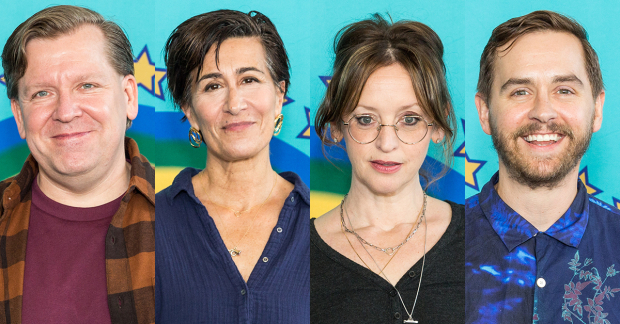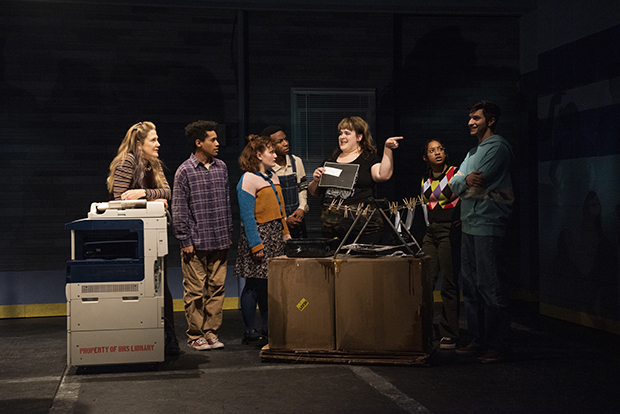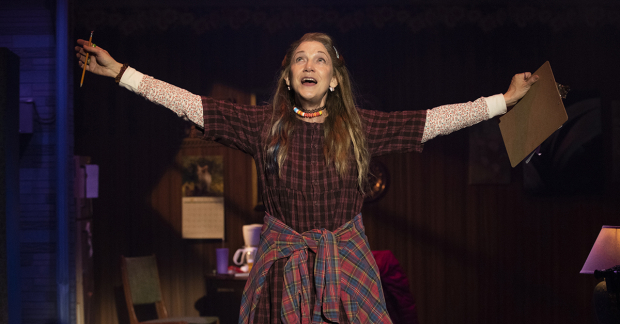Interview: Creating the Musical Kimberly Akimbo on Broadway
David Lindsay-Abaire, Jeanine Tesori, Jessica Stone, and Danny Mefford discuss building this new production at the Booth Theatre after an acclaimed off-Broadway run last year.
It takes a village to make a musical, but that village is exactly what David Lindsay-Abaire and Jeanine Tesori were trying to run away from. The two writers had worked together on Shrek the Musical — a massive production even by Broadway standards — and, for their next project, wanted to do something much more compact.
They settled on another adaptation, this time of one of Lindsay-Abaire's plays. Kimberly Akimbo, which premiered in New York in 2003 via Manhattan Theatre Club, is the life-affirming story of a teenager with an aging disorder that makes her look 70, and her wacky, self-absorbed family.
Acclaimed as a play, Kimberly Akimbo is even more well-regarded as a musical. It won practically every off-Broadway award in sight for its 2021 run at the Atlantic Theater Company, and now makes it Broadway premiere at the Booth Theatre with a cast led by Victoria Clark.
Here, Lindsay-Abaire (book/lyrics), Tesori (score), director Jessica Stone, and choreographer Danny Mefford tell us about building and rebuilding this quirky world.

(© Tricia Baron)
This conversation has been condensed and edited for clarity.
Whose idea was it to turn Kimberly Akimbo into a musical?
Jeanine Tesori: We did Shrek together, and then after we got out of the hospital…[Laughs]
David Lindsay-Abaire: Shrek was hard. It was wonderful in many ways, but there were a lot of cooks in the kitchen.
Jeanine: It was a brand, so there wasn't a lot of — there was some freedom, but not what we really wanted. So, this time, we wanted to do something on our own terms, on our own timeline.
David: I obviously had an amazing time working with Jeanine, and I said "Boy, I wish we could do a musical again, but I wish we could do it like how I write a play." And she said, "What do you mean?" And I said "It's just me. I'm by myself, and it's bad for as long as it needs to be bad and no one's giving me notes until I'm ready to show it to them." With Shrek, we were constantly showing people things before it was finished. Jeanine said, "Well, we can do that. It'll just be me and you, and what about adapting one of your plays?" She was the one that said, "I think Kimberly Akimbo feels like a musical."
How did Jessica and Danny come on board?
Jessica Stone: I was directing David's play Ripcord in Boston, and I wanted to make sure that I did right by him because I know he is a Boston boy, so I reached out to him, and we just got to talking. He mentioned that he was working on an adaption of Kimberly Akimbo and I just remember thinking that it was an amazing idea. It's one of my favorite plays of his. And that was the end of that. I just thought it was a great idea.
David: I could feel your enthusiasm.
Jessica: I just thought it was cool to have coffee with David, and frankly, I had a really fun time that day. He came to Boston for opening night, and I'm not going to say we instantly bonded, but…
David: We instantly bonded. It didn't hurt that she did an expert production of my play. You know, tonally, my plays can be a little weird, and Jessica just knew how to maneuver the comedy of it and grounding it in a very real place. I just thought "Oh, that's a keeper." When David Stone mentioned her for this, it seemed like a great match.
Jessica: And Jeanine had suggested Danny because he choreographed Fun Home.
Danny Mefford: I got an email that I will never forget, that said, "David Stone and Jessica Stone, parentheses, no relation, would like to meet with you about a new David Lindsay-Abaire and Jeanine Tesori project." At that moment I was like "I have to get this job." You know what I mean? Like, this is my job. I came into the meeting and felt an immediate rapport. Having worked with Jeanine before, I knew we're both interested in the way music operates inside of a musical, and I've loved David's plays for a long time.
Jessica: Part of the bond that continues to this day with all of us is a sensibility around humor. Comedy is used to safely explore our darkest experiences and our darkest instincts, and laughter and tears are very tightly wound and bound to each other. And I think we all, in terms of tone and sensibility and taste, we all feel…you know, when something gets sweet, we all feel it needs a little lemon juice.

(© Ahron R. Foster)
Obviously, the Atlantic engagement last year was the run of any writer's dreams: great reviews, sold out, every award you can think of. How do you then shake that all off to prepare the show for Broadway, knowing that the project is already so acclaimed?
Jeanine: Haven't you met us?
Jessica: The neurosis runs deep.
Jeanine: I mean, you just begin again. Everybody at this table is a story hound. I learned a long time ago from a mentor that nothing is neutral. So now we're focusing. And those small things mean a lot. Just yesterday, Danny was like "Does this agree with what they're singing? Do I change it?" That's 45 minutes of work. Being able to do that this time has been a gift.
David: The challenge is also not to break it. The reception was amazing and wonderful and exactly what you want it to be, but I think we're all humble slash insecure enough to quickly put it aside. Now we want to get back in there and look at the B moments and get them to an A minus. Can we strip that away? Can we sharpen this? Can we center her more here? The surgical work that we now have the luxury of getting to do is really exciting, but there's also the fear of making sure you don't cut an artery while you're in there.
Danny: I'm thinking of this Octavia Butler essay where she talks about positive obsession, and she says that if you are an artist and you look at something and you think even a little bit that it could be better, you're not being true to yourself if you don't try. I think about that ton in making a new musical.
Jeanine: That's exactly what it is.
Danny: All the great musicals I have worked on, every single person involved, until they were told "Get your hands off it," are obsessed.
Jessica: And it was Jerome Robbins who said that you don't stop working, you just run out of time.
This was one of our first shows back from the pandemic when we saw it at the Atlantic; the Broadway production is bound to be the same for some people. What do you want the audience to take away from the show? Or how do you want people to interpret it?
David: It's tricky, because if you talk about the plot…it's about a girl with an aging disease. But the main thing is, it's a fun show that's life-affirming and hopefully has deep emotional resonance for people, and it's about living in the moment and finding yourself and appreciating all the good stuff.
Jessica: It's about the choices that you make with the time you have here.
David: That's so much better, Jessica.
Jessica: I did what I could.

(© Ahron R. Foster)









